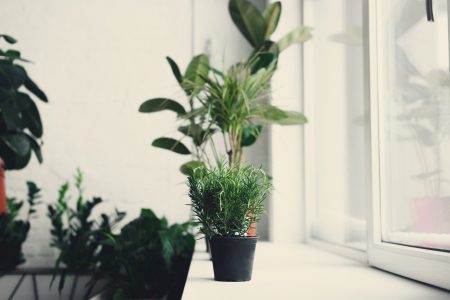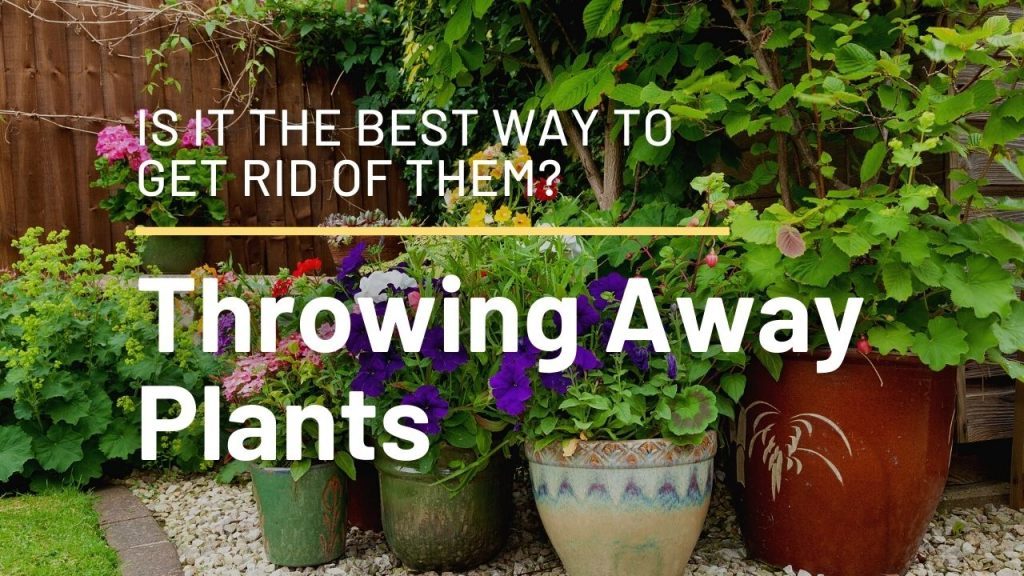Throwing away plants may not always be the best way to eliminate them. While it may seem like an easy solution, there are a few reasons why it may not be the most environmentally friendly or responsible option.
First, plants take resources to grow and produce oxygen, so throwing them away can be a waste. Additionally, plants can often be reused or repurposed in other ways, such as giving them to friends or family members, donating them to a plant exchange or sale, or using them as compost.
If you decide to throw away a plant, it is important to consider the type of plant and whether it is safe to dispose of it in the trash. Some plants, such as invasive species or plants that are toxic to animals, should not be disposed of in the trash because they can pose a risk to the environment or wildlife. In these cases, it is important to properly dispose of the plant to minimize any potential harm.
Overall, it is generally more responsible and sustainable to consider alternatives to throwing away plants, such as finding a new home for them or composting them.
Is It Okay to Throw Away Plants?
Throwing away plants is generally not considered the most environmentally friendly or responsible option. While it may seem like an easy solution, there are a few reasons why this may not be the best option:
- Plants take resources to grow and produce oxygen, so throwing them away can waste them.
- Plants can often be reused or repurposed in other ways, such as giving them to friends or family members, donating them to a plant exchange or sale, or using them as compost.
- Some plants, such as invasive species or plants that are toxic to animals, should not be disposed of in the trash because they can pose a risk to the environment or wildlife. In these cases, it is important to properly dispose of the plant to minimize any potential harm.
Therefore, it is generally more responsible and sustainable to consider alternatives to throwing away plants, such as finding a new home for them or composting them.
Do You Throw Away Old Potting Soil?
Don’t throw away old potting soil. Instead, you should add it to your compost pile to help it regenerate any nutrients that it’s missing. Adding a “compost tea” to old soil is another good way to renew and make it viable again.
Alternative Uses for Discarded Plants
There are several alternative uses for discarded plants that can help reduce waste and promote sustainable living:
- Give them to friends or family members: If you have a plant you no longer want or can care for, consider giving it to someone you know who may be interested.
- Donate them to a plant exchange or sale: Many communities have plant exchanges or sales where people can bring their excess plants and trade or sell them to others.
- Use them as compost: If a plant is no longer viable, it can be added to a compost bin or pile to break down and provide nutrients for new plants.
- Create a new planter: If a plant is no longer thriving in its current pot, it can be transplanted into a new planter with fresh soil.
- Propagate the plant: Some plants can be propagated, or grown from cuttings, to create new plants. This is a great option if you have a plant that is still healthy but needs a new home.
- Use them as decorations: Some plants, such as dried flowers or branches, can be used as decorative elements in home decor projects.
- Create a plant arrangement: If you have several plants you no longer want, you can combine them into a new plant arrangement or terrarium.
- Use them in a craft project: Plants can be used in various craft projects, such as wreaths, papermaking, or dyeing fabrics.
Overall, there are many alternative uses for discarded plants that can help reduce waste and promote sustainable living.
Should Fallen Leaves Be Left In Flower Beds?
Normally, fallen leaves should be left in flower beds. Leaves provide a natural living environment for insects, worms, and other organisms that are helpful to your garden. They also return nutrients to the soil as they decompose, making the soil more nutritious for your plants.

Composting as a Way to Dispose of Plants
Composting is a great way to dispose of plants in an environmentally friendly and sustainable manner. When plants are composted, they break down into organic matter that can be used to enrich the soil and promote healthy plant growth.
To compost plants, you will need a compost bin or pile and various organic materials, including green materials (such as plant trimmings and food scraps) and brown materials (such as dry leaves and twigs). The green materials provide nitrogen, while the brown materials provide carbon. A balance of these materials is important for the composting process to work effectively.
To start composting plants, follow these steps:
- Choose a suitable location for your compost bin or pile. It should be in a convenient location, such as near your garden or kitchen, and should have good drainage.
- Begin adding your organic materials to the compost bin or pile. Mix the green and brown materials and moisten them lightly to help them break down.
- Turn the compost regularly to oxygenate it and help the materials break down quickly.
- Keep an eye on the moisture level of the compost, as it should be damp but not soggy. Add water if needed.
- When the compost is finished, it should be dark, crumbly, and have a rich, earthy smell. You can use it to enrich the soil in your garden or potted plants.
Composting is a great way to dispose of plants because it reduces waste, enriches the soil, and promotes sustainable living. It is also an excellent way to recycle nutrients and reduce the amount of organic matter in landfills.
What Should You Do With Old Garden Plants?
In general, old garden plants should be composted if they’re healthy. Any old garden plants that show signs of disease or bug infestation should be burned or thrown away in your trashcan to prevent them from spreading to other plants.
Plant Exchanges and Sales as a Reuse Option
Plant exchanges and sales are great options for reusing and finding new homes for discarded plants. These events allow people to bring their excess plants and trade or sell them to others.
Plant exchanges and sales can be organized by individuals, community groups, or garden clubs and occur in various settings, such as community centers, parks, or online. Some events may have a specific theme, such as native plants or annuals, while others may be more general.
To participate in a plant exchange or sale, you can:
- Check with local gardening organizations or online groups to see if there are any upcoming events in your area.
- Gather any excess plants you have that you no longer want or can care for. Make sure they are healthy and free of pests or diseases.
- Bring your plants to the event and trade or sell them to others. To trade or sell, you can also bring plant-related items, such as pots, tools, or books.
- Take home any new plants you acquire at the event. Ensure to properly care for them and give them the attention they need to thrive.
Plant exchanges and sales are a great way to find new homes for discarded plants and reduce waste. They can also be a fun and social way to connect with other plant enthusiasts in your community.
Conclusion
Throwing away plants may not always be the best or most environmentally friendly way to eliminate them. There are a variety of alternatives that can help reduce waste and promote sustainable living, such as giving them to friends or family members, donating them to a plant exchange or sale, or composting them.
It is also important to consider the type of plant and whether it is safe to dispose of it in the trash, as some plants, such as invasive species or plants that are toxic to animals, may pose a risk to the environment or wildlife not disposed of properly. Overall, considering alternatives to throwing away plants is generally more responsible and sustainable.

